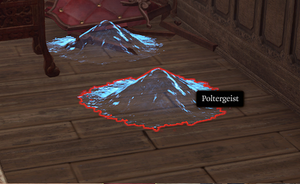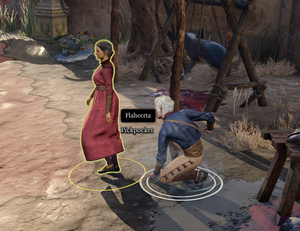Ad placeholder
Crime: Difference between revisions
HarveyPekar (talk | contribs) mNo edit summary |
(→Imprisonment: Added list of all jail cells in the game, minor re-writing) |
||
| (12 intermediate revisions by 4 users not shown) | |||
| Line 19: | Line 19: | ||
* '''Desecrating:''' Moving, picking up, destroying, or reanimating a corpse. | * '''Desecrating:''' Moving, picking up, destroying, or reanimating a corpse. | ||
* '''Pickpocketing:''' Looting an item from a character's inventory using [[sleight of hand]] while [[hiding]]. Can sometimes, but not always, be rectified by returning the stolen items. Being caught in a failed pickpocket and being caught having pickpocketed an item are considered separate crimes. | * '''Pickpocketing:''' Looting an item from a character's inventory using [[sleight of hand]] while [[hiding]]. Can sometimes, but not always, be rectified by returning the stolen items. Being caught in a failed pickpocket and being caught having pickpocketed an item are considered separate crimes. | ||
* '''Assault:''' Committing a harmful act against another character. These can be attacks or spells, with some negative condition-applying spells such as {{SAI|Hypnotic Pattern}} qualifying. | * '''Assault:''' Committing a harmful act against another character. These can be attacks or spells, with some negative condition-applying spells such as {{SAI|Hypnotic Pattern}} qualifying. Creating a harmful [[surface]] underneath a character, such as {{Area|Electrified Water}}, counts as assault.<ref>As of [https://baldursgate3.game/news/patch-6-now-live_108 Patch #6]</ref> | ||
* '''Murder:''' Inflicting the {{Cond|Dead}} condition on another character. Hostility can determine the difference between murder and justified homicide. If the player kills a monster that is hostile to two onlookers, the onlookers won't care; if it's only hostile to one of the onlookers, the other onlooker will consider it murder. Some scripted encounters are never considered murder. | * '''Murder:''' Inflicting the {{Cond|Dead}} condition on another character. Hostility can determine the difference between murder and justified homicide. If the player kills a monster that is hostile to two onlookers, the onlookers won't care; if it's only hostile to one of the onlookers, the other onlooker will consider it murder. Some scripted encounters are never considered murder. | ||
== Investigation == | == Investigation == | ||
Large, populated [[locations]], such as the [[Goblin Camp]] or [[Druid Grove]], have guards that deal with crime. If a civilian witnesses a crime, they can report the crime to a guard, who will run over (often with a full patrol) to search for the offending character. If the culprit is nowhere to be found, they will investigate the area for a number of turns before dispersing, forgetting about the crime. | Large, populated [[locations]], such as the [[Goblin Camp]] or [[Druid Grove]], have guards that deal with crime. If a civilian witnesses a crime, they can report the crime to a guard, who will run over (often with a full patrol) to search for the offending character. If the culprit is nowhere to be found, they will investigate the area for a number of turns before dispersing, forgetting about the crime. The player cannot talk to NPC's while they are investigating a crime. | ||
However, if you interrupt an NPC with {{SAI|Enthrall}} right after they've noticed a crime (signaled by them shouting "Thief!", "Someone's been in my pockets", etc.) but before they start an investigation, they will be forcibly stopped, unable to continue the investigation, they will not call the guards or question any party members and they will not be suspicious of you, allowing for more criminal opportunities. | |||
If you weren't able to prevent NPCs from starting an investigation and they've called the guards or are searching for the complicit party member, another strategy you can adopt is to cast {{SAI|Feign Death}} on said party member since this will prevent NPCs from initiating conversations. The guards generally disperse before the spell runs out, so you'll be free to wander after without arousing suspicion. Note that the severity of the crime might incriminate your other party members, so this strategy is best left for smaller crimes like pickpocketing, or when the criminal party member is on their own. Casting Feign Death on a party member that's already being questioned, on the other hand, does nothing. | |||
=== Questioning === | === Questioning === | ||
| Line 30: | Line 34: | ||
== Imprisonment == | == Imprisonment == | ||
If a | If a party member acquiesces to their crime and gets imprisoned, they will have their inventory stripped and be instantly teleported to a designated jail zone. They will retain any equipment they're wearing but lose access to their weapons, torches, instruments, and the rest of their inventory. The apprehended character's inventory is placed, in full, within a nearby '''Equipment chest''' while any items they stole (if caught for thievery) will be in an '''Evidence chest'''. | ||
Each of these jail cells has methods of escape baked in so that the character can, with enough ingenuity, escape on their own. For example, the jail cell in the Emerald Grove has a breakable wall and back exit along the side of a cliff. | |||
Fleeing from prison inflicts the temporary {{Cond|Fugitive}} condition on the criminal. If found within a guard's line-of-sight while active, the criminal will be | Fleeing from prison inflicts the temporary {{Cond|Fugitive}} condition on the criminal. If found within a guard's line-of-sight while active, the criminal will be re-arrested or fought. | ||
If a party member uses {{SAI|Disguise Self}} to commit a crime while looking like someone else and then dismisses it before escaping, or vice versa, they can walk freely in front of guards without being recognized as an escapee. This only works once per character and per jail, any subsequent escape from the same jail with the use of this spell will result in being recognized and caught immediately. This doesn't seem to work in Act 3's [[Lower City]], as guards will recognize party members no matter what. | |||
===List of all Jail cells=== | |||
* [[Makeshift Prison]] within the [[Emerald Grove]] (for crimes in the Emerald Grove) | |||
* [[Worg Pens]] in the [[Shattered Sanctum]] (for crimes in the Goblin Camp and Shattered Sanctum) | |||
* [[Last Light Inn - Cellar]] underneath the [[Last Light Inn]] (for crimes in the Last Light Inn) | |||
* [[Moonrise Towers Prison]] under [[Moonrise Towers]] (for crimes in Moonrise Towers) | |||
* [[Wyrm's Rock Prison]] in [[Wyrm's Rock Fortress]] (for crimes in [[Rivington]]) | |||
* [[Heapside Prison]] under the [[Basilisk Gate Barracks]] (for crimes in the [[Lower City]]) | |||
== Related conditions == | == Related conditions == | ||
| Line 38: | Line 54: | ||
* {{Cond|Fugitive}} | * {{Cond|Fugitive}} | ||
* {{Cond|Enemy of Justice}} | * {{Cond|Enemy of Justice}} | ||
* | * {{Cond|Witness}} | ||
== Rewards == | == Rewards == | ||
| Line 44: | Line 60: | ||
=== Achievements === | === Achievements === | ||
{{Achievement|Escapologist}}{{Inflicts|Fugitive}} | {{Achievement|Escapologist}} | ||
== References == | |||
{{Reflist}}{{Inflicts|Fugitive}} | |||
{{NavGameplay}} | |||
Latest revision as of 04:09, 25 June 2024
Crime is a gameplay mechanic in Baldur's Gate 3. Certain morally dubious actions, from destruction of property to murder, if done in view of non-player characters, will result in attitude reductions and, potentially, imprisonment or combat. With the appropriate use of actions and abilities, the consequences of crime can be avoided.
Committing crimes[edit | edit source]
A variety of crimes can be committed during the player's journeys. Crimes are committed individually by characters and punishments are meted out similarly; if one character is caught pickpocketing, only that character will be questioned by guards and risks imprisonment, not the whole party.

Ownership is a concept interrelated to crime, as it applies to items and other non-character entities in the game. Any object that is outlined in red when hovered over is owned by another character or entity, restricting the player's interactions with it; tampering with these objects is considered criminal. Corpses of characters adhere to this rule as well. For example, a player can potentially get away with murdering an NPC, but get in trouble if someone catches them picking up the NPC's red-outlined, "restricted" corpse.
Magnitude[edit | edit source]
Crimes vary in magnitude, and the bandwidth for NPC's to tolerate crimes varies based on area and NPC. Some NPC's will be annoyed by a witnessed crime, reducing their attitude to the offender, but take no action. Two NPC's might have different responses to the same crime. One character might try to arrest a player for stealing, but another might attack them outright.
List of crimes[edit | edit source]
The various crimes at the player's disposal are:
- Moving: Moving an object that belongs to another entity. Always[Needs Verification] considered a mere attitude-reducing annoyance. A witness to unpermitted moving will usually pick up the offended item.
- Vandalism: Destroying an object that belongs to another entity.
- Trespassing: Setting foot in a restricted area or opening a red-outlined door. Can sometimes be rectified by agreeing to leave the area, which will instantly teleport the offending characters to a neutral area.
- Stealing: Picking up an object that belongs to another entity. Can sometimes be rectified by dropping the item.
- Desecrating: Moving, picking up, destroying, or reanimating a corpse.
- Pickpocketing: Looting an item from a character's inventory using sleight of hand while hiding. Can sometimes, but not always, be rectified by returning the stolen items. Being caught in a failed pickpocket and being caught having pickpocketed an item are considered separate crimes.
- Assault: Committing a harmful act against another character. These can be attacks or spells, with some negative condition-applying spells such as qualifying. Creating a harmful surface underneath a character, such as
 Electrified Water, counts as assault.[1]
Electrified Water, counts as assault.[1] - Murder: Inflicting the condition on another character. Hostility can determine the difference between murder and justified homicide. If the player kills a monster that is hostile to two onlookers, the onlookers won't care; if it's only hostile to one of the onlookers, the other onlooker will consider it murder. Some scripted encounters are never considered murder.
Investigation[edit | edit source]
Large, populated locations, such as the Goblin Camp or Druid Grove, have guards that deal with crime. If a civilian witnesses a crime, they can report the crime to a guard, who will run over (often with a full patrol) to search for the offending character. If the culprit is nowhere to be found, they will investigate the area for a number of turns before dispersing, forgetting about the crime. The player cannot talk to NPC's while they are investigating a crime.
However, if you interrupt an NPC with right after they've noticed a crime (signaled by them shouting "Thief!", "Someone's been in my pockets", etc.) but before they start an investigation, they will be forcibly stopped, unable to continue the investigation, they will not call the guards or question any party members and they will not be suspicious of you, allowing for more criminal opportunities.
If you weren't able to prevent NPCs from starting an investigation and they've called the guards or are searching for the complicit party member, another strategy you can adopt is to cast on said party member since this will prevent NPCs from initiating conversations. The guards generally disperse before the spell runs out, so you'll be free to wander after without arousing suspicion. Note that the severity of the crime might incriminate your other party members, so this strategy is best left for smaller crimes like pickpocketing, or when the criminal party member is on their own. Casting Feign Death on a party member that's already being questioned, on the other hand, does nothing.
Questioning[edit | edit source]

If the culprit is caught by the guards, interrogatory dialogue begins. On some occasions, the criminal can try to rectify the crime by undoing it or bribing the interrogator. If committing crime in a location with a designated jail, the criminal can submit to arrest. Otherwise, the following options are always present: engage in combat, or try to wriggle out of it using a Persuasion, Intimidation, or Deception check. These ability checks generally become more difficult as the magnitude of the crime increases.
Imprisonment[edit | edit source]
If a party member acquiesces to their crime and gets imprisoned, they will have their inventory stripped and be instantly teleported to a designated jail zone. They will retain any equipment they're wearing but lose access to their weapons, torches, instruments, and the rest of their inventory. The apprehended character's inventory is placed, in full, within a nearby Equipment chest while any items they stole (if caught for thievery) will be in an Evidence chest.
Each of these jail cells has methods of escape baked in so that the character can, with enough ingenuity, escape on their own. For example, the jail cell in the Emerald Grove has a breakable wall and back exit along the side of a cliff.
Fleeing from prison inflicts the temporary condition on the criminal. If found within a guard's line-of-sight while active, the criminal will be re-arrested or fought.
If a party member uses to commit a crime while looking like someone else and then dismisses it before escaping, or vice versa, they can walk freely in front of guards without being recognized as an escapee. This only works once per character and per jail, any subsequent escape from the same jail with the use of this spell will result in being recognized and caught immediately. This doesn't seem to work in Act 3's Lower City, as guards will recognize party members no matter what.
List of all Jail cells[edit | edit source]
- Makeshift Prison within the Emerald Grove (for crimes in the Emerald Grove)
- Worg Pens in the Shattered Sanctum (for crimes in the Goblin Camp and Shattered Sanctum)
- Last Light Inn - Cellar underneath the Last Light Inn (for crimes in the Last Light Inn)
- Moonrise Towers Prison under Moonrise Towers (for crimes in Moonrise Towers)
- Wyrm's Rock Prison in Wyrm's Rock Fortress (for crimes in Rivington)
- Heapside Prison under the Basilisk Gate Barracks (for crimes in the Lower City)
Related conditions[edit | edit source]
Rewards[edit | edit source]
Crime can pay, outside of the material benefits of the crime itself. The background gains many Inspirations from committing and then escaping criminal acts, with and benefitting as well to a lesser extent.
Achievements[edit | edit source]

